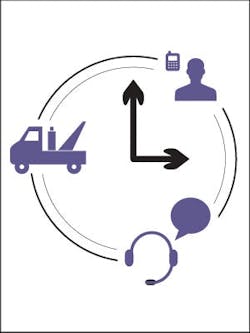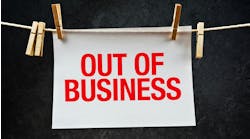A USA Collision Centers customer recently attempted to pick up her vehicle on a Saturday. The vehicle was supposed to be waiting in the parking lot with the keys locked inside. But someone at the shop dropped the ball: The car was there, but the keys were nowhere in sight. And the shop is closed on weekends.
Fortunately, the shop uses a 24-hour call center to ensure strong customer service. So when the frustrated customer called the shop expecting to leave a message, she was surprised that someone answered immediately. The call center representative listened to the problem and relayed the message to the shop manager while the customer was still on the line. Within minutes, the shop manager was on the scene, the keys retrieved, and the customer drove home happy.
The shop made an unfortunate mistake by forgetting about the keys. But mistakes do happen. What customers remember most is how those errors are handled.
—Joe Sanfillipo, chief operating officer, USA Collision Centers
Joe Sanfillipo, chief operating officer of USA Collision Centers, a five-shop operation based in Fairfield, Ohio, says the 24-hour call center is hugely beneficial—and not just on the weekends. Customers commonly call after business hours for general questions (What’s your address? Can I schedule an appointment?) or right after an accident has occurred. For that customer, especially, a human voice to answer questions immediately is great customer service, indeed.
Sanfillipo hired a third-party company, Communications Marketing Services Inc. based in St. Louis, seven years ago to man his shop’s phone lines after business hours. He simply enabled call forwarding on the shop’s office phone lines.
Call center representatives follow a script so they answer the phone the same way shop customer service representatives (CSRs) do. There’s nothing to indicate customers are speaking with a call center, rather than a shop employee.
The call center can answer questions about the shop, arrange towing services, call police or family members, schedule repairs, direct customers toward the closest USA Collision Centers location, and even offer step-by-step directions to get there.
Immediately following each call fielded by the center, the shop manager and the location’s CSR receive an email explaining what happened and whether additional follow-up is necessary to meet customer needs.
The call center fields after-hours calls regularly—about 80 a month for each of the company’s locations. And calls come in at all hours of the day, as well as weekends and holidays.
“Call center environments have all the tools necessary right in front of them to offer customer assistance seamlessly and quickly,” Sanfillipo says. “[The experience is] a lot more professional and credible for the customer, and more trustworthy for the shop owner.”
Customer Service Improvement
The call center service costs Sanfillipo $100 a month for each shop location—$500 total for the company. The customer service benefit, he says, is invaluable.
People don’t have accidents often, and they tend to be out of sorts when they do, Sanfillipo says. In that instance, customers are looking for experts to offer guidance, to help ease their mind and to lower their stress level. Immediate answers to their questions accomplish that. Leaving a voice message and waiting overnight for an answer can have exactly the opposite effect—and may prompt customers to call another shop in hopes of getting their needs met right away.
“It really helps win customers over when they can talk to a live person, explain their situation, and ask specific questions,” Sanfillipo says. “It’s a much more personable way of doing business.”
—Kurt Barks, owner, Complete Auto Body and Repair
Before Sanfillipo contracted with a call center for after-hours inquiries, he received those calls on his cell phone.
While that seems straightforward, Sanfillipo encountered quite a few sticking points:
Employees need a company-paid cell phone to take to and from work.
Employees have to be dedicated to always answer their phone.
How many calls are they missing?
What state of mind are employees in when answering the phone?
Do employees sound sleepy, groggy or upset when answering the phone at strange hours?
What happens if employees are ill or out of town?
Are employees distracted by other tasks that would make them unable to properly assist the customer?
Kurt Barks, owner of Complete Auto Body and Repair in St. Louis, agrees. He says customers commonly mentioned they called the shop, but were frustrated that nobody answered and there was no immediate response to after-hours messages. So he implemented a 24-hour service similar to Sanfillipo’s nine months ago through a call center called Live Wire. The call center fields roughly 65 after-hours calls a week for the shop and costs $400 a month.
“Today, customers want responses and answers as fast as possible,” Barks says, noting that the shop pulled in three additional jobs a month within 60 days of launching the program. “This is all about customer service. People don’t want to speak to a computer; they want to talk to somebody who cares.”
Service is a Differentiator
Many shops do great work and nearly everyone offers a warrantee. But customer service can be a differentiator. The call center service, Sanfillipo says, has distinguished USA Collision Centers from competing shops. Here’s why:
• Repair process speed. Thanks to information provided overnight by the call center, customer vehicles can be waiting in the parking lot, ready to be repaired as soon as the shop opens for business. Neither the customer nor the shop loses any time the next morning waiting around for a call or a call back, Sanfillipo says. That helps the shop get started on repairs sooner, which makes for a faster return of car to customer. As a result, customer satisfaction
goes up.
• No waiting on work. Some customers can’t call during shop hours because they’re at work. This gives them an outlet to talk during their free time, Sanfillipo says.
• Always answering. Sanfillipo says if the shop’s front office happens to be short-staffed, he will forward all calls to the call center during the workday. That ensures someone will always answer calls immediately, and in a friendly manner, even when the office staff is busy.
“In today’s market, the only way to compete is to offer better service,” Barks says. “Shops need to step up and offer the service that customers deserve.”



